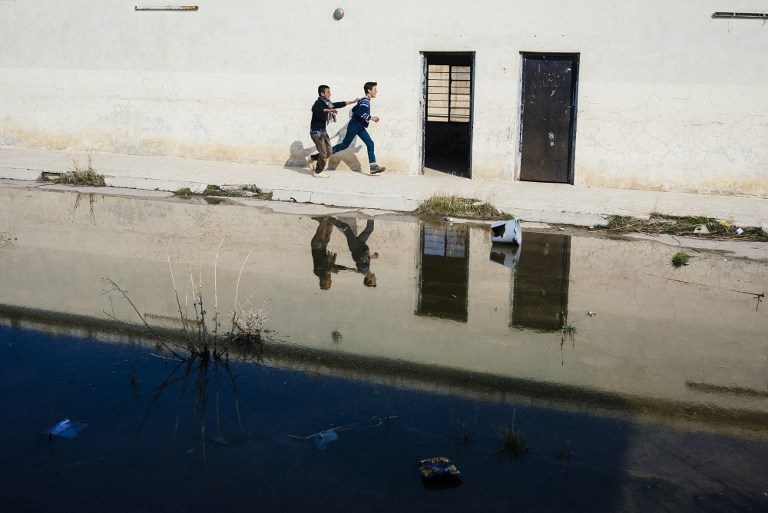SUMMARY
This is AI generated summarization, which may have errors. For context, always refer to the full article.

MOSUL, Iraq – Iraqi forces retook the last area of Mosul east of the Tigris River Tuesday, January 24, 100 days into an offensive whose next phase aid groups warned could have dire consequences for civilians.
Army units flushed out fighters of the Islamic State (ISIS) group from a rural area on the northern edge of Mosul, completing an important step in Iraq’s largest military operation in years.
“The Iraqi flag was raised and the left side (east bank) was thus fully liberated,” the Joint Operations Command coordinating the fight against ISIS said in a statement.
Commanders from the elite Counter-Terrorism Service that has done most of the fighting and Prime Minister Haider al-Abadi had already declared east Mosul “liberated” last week.
The 3 months it took to reconquer Mosul’s east saw some tough fighting, but even deadlier battles are expected on its west bank, home to the narrow streets of the Old City and some of IS’s traditional redoubts.
That has sparked deep concern among the aid community over the fate of the estimated 750,000 civilians still believed to live in western Mosul.
“We hope that everything is done to protect the hundreds of thousands of people who are across the river in the west,” the United Nations’ humanitarian coordinator for Iraq, Lise Grande, said in a statement.
“We know that they are at extreme risk and we fear for their lives.”
Tens of thousands of security forces now surround the jihadists in west Mosul, who are all but trapped in the city where their leader Abu Bakr al-Baghdadi proclaimed his “caliphate” in 2014.
Bridges bombed
Residents of west Mosul and civil activists told Agence France-Presse on Monday that ISIS had forced civilians along the riverfront to leave their shops and houses.
“The group forced us to leave our homes… without allowing us to take our belongings,” a resident of Al-Maidan said. “It deployed gun positions and posted snipers on roofs and at windows.”
Facing them across the river are some of Iraq’s most seasoned elite forces, whose engineers some reports said were already working on pontoon bridges for a cross-river assault.
All bridges across the Tigris in Mosul were either bombed by ISIS or hit by air strikes carried out by the US-led coalition that has helped Iraq reclaim about two thirds of the territory it lost to IS in 2014.
“The Iraqi forces have over the course of their battle against Daesh (ISIS) in this country developed the capability to do bridging, including bridging while under fire,” coalition spokesman Colonel John Dorrian said.
The coalition has meanwhile sought to prevent ISIS from moving on the Tigris, destroying more than 100 boats in the area over 6 days, it said.
The UN had feared an exodus of unprecedented proportions before the Mosul offensive began on October 17, but while 180,000 people did flee their homes, the majority stayed.
It now estimates that 750,000 people still live on Mosul’s west bank, either because they did not want to leave or were prevented from doing so by ISIS, which has routinely used civilians as human shields.
Death blow
“We don’t know what will happen in western Mosul but we cannot rule out the possibility of siege-like conditions or a mass exodus,” Grande said.
“To date, nearly half of all the casualties from Mosul are civilians. It’s terrifying to think of the risks families are facing,” she said.
The Norwegian Refugee Council, which assists some of the displaced families, also said the lack of access to west Mosul was a source of great concern, given the humanitarian crisis that fighting in the east had already caused.
“Those still trapped inside Mosul city are in even graver danger due to the fighting and shortages and, 100 days since the fighting started, we still have no way to reach them,” it said in a statement.
The recapture of Mosul by Iraqi forces would deal a death blow to the Iraqi part of ISIS’s caliphate, with the next major target its Raqa stronghold in neighboring Syria.
In retaken areas of eastern Mosul, efforts to resume a normal life have picked up, with many shops reopening and children starting to go back to school.
The UN Children’s Fund said 30 schools had reopened this week.
“After the nightmare of the past two years, this is a pivotal moment for the children of Mosul to reclaim their education and their hope for a better future,” UNICEF’s Iraq representative Peter Hawkins said.
The UN said more than 20,000 people displaced since the Mosul offensive began have already returned to their homes in areas retaken from ISIS. – Rappler.com
Add a comment
How does this make you feel?
There are no comments yet. Add your comment to start the conversation.